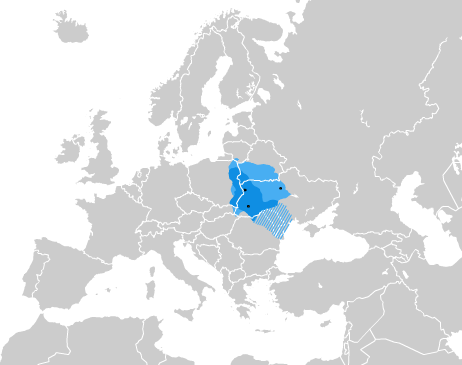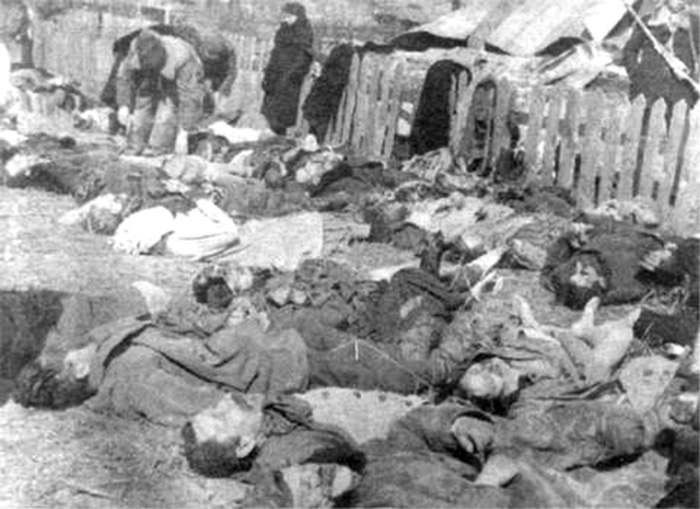|
Mirosław Hermaszewski
Mirosław Hermaszewski (; 15 September 1941 – 12 December 2022) was a Polish cosmonaut, fighter plane pilot, and Polish Air Force officer. He became the first, and at the time of his death in December 2022, the only, Polish national in space when he flew aboard the Soviet Soyuz 30 spacecraft in 1978. He was the 89th human to reach outer space. Early life and education Mirosław Hermaszewski was born on 15 September 1941 into a Polish family in Lipniki, formerly in the Wołyń Voivodeship of Poland, but at the time part of Reichskommissariat Ukraine, and since the end of the Second World War located in Ukraine. The youngest of Roman Hermaszewski and Kamila Bielawska's seven children, Mirosław was a survivor of the Volhynian slaughter during which Ukrainian nationalists murdered 19 members of his family, including his father. Hermaszewski narrowly escaped death himself when the Ukrainian Insurgent Army attacked Lipniki on the night of 26–27 March 1943. At the time of the m ... [...More Info...] [...Related Items...] OR: [Wikipedia] [Google] [Baidu] |
Interkosmos
Interkosmos (russian: Интеркосмос) was a Soviet space program, designed to help the Soviet Union's allies with crewed and uncrewed space missions. The program was formed in April 1967 in Moscow. All members of the program from USSR were given the Hero of the Soviet Union medal or the Order of Lenin. The program included the allied east-European states of the Warsaw Pact, Eastern Bloc, CoMEcon, and other socialist states like Afghanistan, Cuba, Mongolia, and Vietnam. In addition, pro-Soviet non-aligned states such as India and Syria participated, and even states such as the United Kingdom, France and Austria, despite them being capitalist states. Following the Apollo–Soyuz, there were talks between NASA and Interkosmos in the 1970s about a "Shuttle-Salyut" program to fly Space Shuttle missions to a Salyut space station, with later talks in the 1980s even considering flights of the future ''Buran''-class orbiter to a future US space station. Wikisource:Mir Hardwar ... [...More Info...] [...Related Items...] OR: [Wikipedia] [Google] [Baidu] |
Wołów
Wołów (german: Wohlau, cz, Volov) is a town in Lower Silesian Voivodeship in south-western Poland. It is the seat of Wołów County and Gmina Wołów. It lies approximately north-west of the regional capital Wrocław. , the town has a population of 12,373. It is part of the larger Wrocław metropolitan area. Name The town's name is derived from the Polish word ''wół'' (" ox"). History The area around Wołów has been settled since prehistoric times. It became part of the emerging Polish state in the late 10th century under Mieszko I of Poland. The town was first mentioned in 1157 when a wooden castle founded by Senior Duke of Poland Władysław II the Exile is documented, which developed into a castle complex, which was again mentioned in 1202. Two villages developed near the castle, one of them called Wołowo. Probably in the second half of the 13th century the town was founded near Wołowo and partially on the soil of the second village.Weczerka, p.570 Wołów received ... [...More Info...] [...Related Items...] OR: [Wikipedia] [Google] [Baidu] |
Polish Population Transfers (1944–46)
Polish may refer to: * Anything from or related to Poland, a country in Europe * Polish language * Poles, people from Poland or of Polish descent * Polish chicken * Polish brothers (Mark Polish and Michael Polish, born 1970), American twin screenwriters Polish may refer to: * Polishing, the process of creating a smooth and shiny surface by rubbing or chemical action ** French polishing, polishing wood to a high gloss finish * Nail polish * Shoe polish * Polish (screenwriting), improving a script in smaller ways than in a rewrite See also * * * Polonaise (other) A polonaise ()) is a stately dance of Polish origin or a piece of music for this dance. Polonaise may also refer to: * Polonaises (Chopin), compositions by Frédéric Chopin ** Polonaise in A-flat major, Op. 53 (french: Polonaise héroïque, ... {{Disambiguation, surname Language and nationality disambiguation pages ... [...More Info...] [...Related Items...] OR: [Wikipedia] [Google] [Baidu] |
Ukrainian Soviet Socialist Republic
The Ukrainian Soviet Socialist Republic ( uk, Украї́нська Радя́нська Соціалісти́чна Респу́бліка, ; russian: Украи́нская Сове́тская Социалисти́ческая Респу́блика, group=note), abbreviated as the Ukrainian SSR, UkrSSR, or UkSSR, and also known as Soviet Ukraine, was one of the Republics of the Soviet Union, constituent republics of the Soviet Union from 1922 until 1991. In the anthem of the Ukrainian Soviet Socialist Republic, anthem of the Ukrainian SSR, it was referred to simply as ''History of Ukraine, Ukraine''. Under the Soviet One-party state, one-party model, the Ukrainian SSR was governed by the Communist Party of the Soviet Union through its Soviet democracy, republican branch: the Communist Party of Ukraine (Soviet Union), Communist Party of Ukraine. The first iterations of the Ukrainian SSR were established during the Russian Revolution, particularly after the October Revol ... [...More Info...] [...Related Items...] OR: [Wikipedia] [Google] [Baidu] |
Nationalism
Nationalism is an idea and movement that holds that the nation should be congruent with the State (polity), state. As a movement, nationalism tends to promote the interests of a particular nation (as in a in-group and out-group, group of people),Anthony D. Smith, Smith, Anthony. ''Nationalism: Theory, Ideology, History''. Polity (publisher), Polity, 2010. pp. 9, 25–30; especially with the aim of gaining and maintaining the nation's sovereignty (self-governance) over its homeland to create a nation-state. Nationalism holds that each nation should govern itself, free from outside interference (self-determination), that a nation is a natural and ideal basis for a polity, and that the nation is the only rightful source of political power. It further aims to build and maintain a single national identity, based on a combination of shared social characteristics such as culture, ethnicity, geographic location, language, politics (or the government), religion, traditions and belief ... [...More Info...] [...Related Items...] OR: [Wikipedia] [Google] [Baidu] |
Western Ukraine
Western Ukraine or West Ukraine ( uk, Західна Україна, Zakhidna Ukraina or , ) is the territory of Ukraine linked to the former Kingdom of Galicia–Volhynia, which was part of the Polish–Lithuanian Commonwealth, the Austrian Empire, Austria-Hungary and the Second Polish Republic, and came fully under the control of the Soviet Union (via the Ukrainian Soviet Socialist Republic) only in 1939, following the Molotov–Ribbentrop Pact. There is no universally accepted definition of the territory's boundaries (see the map, right), but the contemporary Ukrainian administrative regions or Oblasts of Chernivtsi, Ivano-Frankovsk, Lviv, Ternopil and Transcarpathia (which were part of the former Austro-Hungarian Empire) are nearly always included and the Lutsk and Rivne Oblasts (parts of the annexed from Poland during its Third Partition) are usually included. It is less common to include the Khmelnytski and, especially, the Vinnytsia and Zhytomyr Oblasts in ... [...More Info...] [...Related Items...] OR: [Wikipedia] [Google] [Baidu] |
Ukrainians
Ukrainians ( uk, Українці, Ukraintsi, ) are an East Slavic ethnic group native to Ukraine. They are the seventh-largest nation in Europe. The native language of the Ukrainians is Ukrainian. The majority of Ukrainians are Eastern Orthodox Christians. While under the Polish–Lithuanian Commonwealth, the Austrian Empire, and then Austria-Hungary, the East Slavic population who lived in the territories of modern-day Ukraine were historically known as Ruthenians, referring to the territory of Ruthenia, and to distinguish them with the Ukrainians living under the Russian Empire, who were known as Little Russians, named after the territory of Little Russia. Cossack heritage is especially emphasized, for example in the Ukrainian national anthem. Ethnonym The ethnonym ''Ukrainians'' came into wide use only in the 20th century after the territory of Ukraine obtained distinctive statehood in 1917. From the 14th to the 16th centuries the western portions of the Europe ... [...More Info...] [...Related Items...] OR: [Wikipedia] [Google] [Baidu] |
Banderites
A Banderite or BanderoviteAlso referred to as ''Banderivets'', ''Banderovets'', ''Banderovtsy'', ''Benderovets'', ''Banderite'', ''Bandera'', or ''Banderlog''. ( uk, бандерівець, bandеrivets; pl, Banderowiec; russian: бандеровец, bandеrovets) was a member of OUN-B, a faction of the Organization of Ukrainian Nationalists, nicknamed "Bandera's people". The term, used from late 1940 onward, derives from the name of Stepan Bandera (1909–1959), head of this faction of the OUN. Because of the brutality utilized by OUN-B members, the colloquial term Banderites quickly earned a negative connotation, particularly among Poles and Jews. By 1942, the expression was well-known and frequently used in western Ukraine to describe the Ukrainian Insurgent Army partisans, OUN-B members or any other Ukrainian perpetrators. The OUN-B, had been engaged in various atrocities, including murder of civilians, most of whom were ethnic Poles, Jews and Romani people. Bandera was n ... [...More Info...] [...Related Items...] OR: [Wikipedia] [Google] [Baidu] |
NaTemat
NaTemat.pl (lit. ''OnTopic'') is a Polish language website created by Tomasz Lis on 22 February 2012. It includes a wide variety of content including latest events, politics, lifestyle, culture, social issues and economic and sports information. After seven months since the creation of naTemat, the boss and editor-in-chief Tomasz Machała reported that the website had exceeded one million unique visitors. According to the January 2013 study of the Polish internet by Megapanel_PBI/Gemius, the website was 15th place in the category of "information and journalism" with 940,495 real users. The service combines editorial content and blogs. The approximately 400 authors include Janusz Palikot, Jacek Dehnel, Sebastian Gojdź Justyna Kowalczyk, Marcin Orliński, Jacek Rostowski, Krzysztof Hołowczyc, Aleksander Kwaśniewski, Krystyna Kofta Krystyna is a Polish variant of name Christine or Christina. It may refer to: People with the name *Krystyna Chojnowska-Liskiewicz (born 19 ... [...More Info...] [...Related Items...] OR: [Wikipedia] [Google] [Baidu] |
Ukrainian Insurgent Army
The Ukrainian Insurgent Army ( uk, Українська повстанська армія, УПА, translit=Ukrayins'ka povstans'ka armiia, abbreviated UPA) was a Ukrainian nationalist paramilitary and later partisan formation. During World War II, it was engaged in guerrilla warfare against the Soviet Union, the Polish Underground State, Communist Poland, and Nazi Germany. It was established by the Organization of Ukrainian Nationalists. The insurgent army arose out of separate militant formations of the Organization of Ukrainian Nationalists— Bandera faction (the OUN-B), other militant national-patriotic formations, some former defectors of the Ukrainian Auxiliary Police, mobilization of local populations and others.Vedeneyev, D. Military Field Gendarmerie – special body of the Ukrainian Insurgent Army'. "Voyenna Istoriya" magazine. 2002. The political leadership of the army belonged to the OUN-B. It was the primary perpetrator of the ethnic cleansing of Poles in V ... [...More Info...] [...Related Items...] OR: [Wikipedia] [Google] [Baidu] |
Massacres Of Poles In Volhynia
The massacres of Poles in Volhynia and Eastern Galicia ( pl, rzeź wołyńska, lit=Volhynian slaughter; uk, Волинська трагедія, lit=Volyn tragedy, translit=Volynska trahediia), were carried out in German-occupied Poland by the Ukrainian Insurgent Army, or the UPA, with the support of parts of the local Ukrainian population against the Polish minority in Volhynia, Eastern Galicia, parts of Polesia and Lublin region from 1943 to 1945. The peak of the massacres took place in July and August 1943. Most of the victims were women and children. Many of the Polish victims regardless of age or gender were tortured before being killed; some of the methods included rape, dismemberment or immolation, among others. The UPA's actions resulted in between 50,000 and 100,000 deaths. According to Timothy Snyder, the ethnic cleansing was a Ukrainian attempt to prevent the post-war Polish state from asserting its sovereignty over Ukrainian-majority areas that had been part of the ... [...More Info...] [...Related Items...] OR: [Wikipedia] [Google] [Baidu] |



